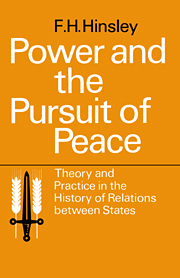Book contents
- Frontmatter
- Contents
- INTRODUCTION
- PART I A HISTORY OF INTERNATIONALIST THEORIES
- PART II A HISTORY OF THE MODERN STATES' SYSTEM TO 1900
- 8 The Beginnings of the System
- 9 The First Fifty Years
- 10 The Concert of Europe
- 11 International Relations in the Second Half of the Nineteenth Century
- PART III INTERNATIONAL RELATIONS AND INTERNATIONAL ORGANIZATIONS IN THE TWENTIETH CENTURY
- References
- Index
10 - The Concert of Europe
Published online by Cambridge University Press: 11 January 2010
- Frontmatter
- Contents
- INTRODUCTION
- PART I A HISTORY OF INTERNATIONALIST THEORIES
- PART II A HISTORY OF THE MODERN STATES' SYSTEM TO 1900
- 8 The Beginnings of the System
- 9 The First Fifty Years
- 10 The Concert of Europe
- 11 International Relations in the Second Half of the Nineteenth Century
- PART III INTERNATIONAL RELATIONS AND INTERNATIONAL ORGANIZATIONS IN THE TWENTIETH CENTURY
- References
- Index
Summary
When the Congress system proved unworkable the notion of a coalition of leading states, founded on a public law for the defence of that law, was not abandoned. It was set free from its earlier association with the determination to govern the world―from the form the Congress idea at first assumed when it at last replaced, at the beginning of the nineteenth century, the aspiration to universal monarchy. A looser association of the Great Powers continued in existence―an attenuated Congress system limited to dealing with problems as they arose, not seeking to anticipate them or to iron them out of existence. The public law which was applied to these problems was enriched and reinforced by the passage of time and the growth of precedent but was restricted to what the looser association could agree on, and thus to strictly international questions. These were the two outstanding features of what came to be called the Concert of Europe.
This shift to a looser organisation among the Great Powers was reflected in the terminology of the time. Contemporaries did not define the words Congress and Conference precisely. Because of their inconsistencies it remains impossible to state exactly how they distinguished between the functions of these two forms of international proceeding.
- Type
- Chapter
- Information
- Power and the Pursuit of Peace: Theory and Practice in the History of Relations Between States , pp. 213 - 237Publisher: Cambridge University PressPrint publication year: 1962



